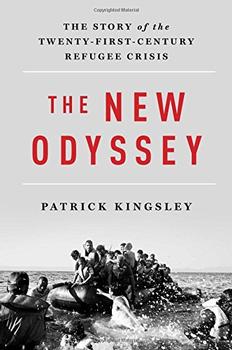Summary | Excerpt | Reviews | Beyond the Book | Readalikes | Genres & Themes | Author Bio

The Story of the Twenty-First Century Refugee Crisis
by Patrick Kingsley PROLOGUE
Wednesday, 15 April 2015, 11 p.m
In the darkness far out to sea, Hashem al-Souki can't see his neighbours but he can hear them scream. It's partly his fault. They are two African women – perhaps from Somalia, but now is not the time to ask – and Hashem is spreadeagled on top of them. His limbs dig into theirs. They want him to move, fast, and so does he. But he can't – several people are sprawled on top of him, and there's possibly another layer above them. Dozens are crammed into this wooden dinghy. If anyone tries to shift, a smuggler kicks them back into place. They don't want the crammed boat to overbalance, teeter, and then possibly sink. It is perhaps eleven at night, but Hashem can't be certain. He's losing track of time, and of place. Earlier in the evening, on a beach at the northernmost tip of Egypt, he and his companions were herded into this little boat. Now the boat is who-knows-where, bobbing along in the pitch darkness, lurching in the waves, somewhere in the southeastern Mediterranean. And its passengers are screaming. Some of the screams are in Arabic, some not. There are people from across Africa here, others from across the Middle East. There are Palestinians, Sudanese and Somalians. And Syrians, like Hashem. They want to get to northern Europe: Sweden, Germany or anywhere that offers them a better future than their collapsed homelands. For that distant hope they are risking this boat trip to the Italian coast. All being well, they should reach Italy in five or six days. But, for now, Hashem doesn't know if he'll survive the night. Or if anyone will. An hour passes. They reach a second boat, a bigger one, and then a third, bigger still. At each new vessel, the smugglers toss them over the side like bags of potatoes. Now they have a bit more space, but they're soaked. They had to wade through the waves to get to the dinghy, and the second boat was full of water. Their clothes drenched, they shiver. And they retch. The person squeezed to his left pukes all over Hashem. Then Hashem pays the favour forward, spewing all over the person to his right. He looks up, and realises everyone's at it; everyone's clothes are caked in other people's vomit. Each has paid more than $2000 to spew over fellow refugees. 'It's a vomiting party,' Hashem thinks to himself.
Perhaps the most extraordinary part of this scene is just how ordinary it has become. The world is currently witnessing the biggest wave of mass migration since the Second World War – and the most dramatic example of this phenomenon is occurring in the Mediterranean sea. Since 2014, over 1.4 million people crossed the Mediterranean in leaking boats like this one,1 as civil wars in Syria, Afghanistan and Iraq – and repression and poverty in Africa – push an unprecedented number of people towards Europe. For years, the burden of the global refugee crisis has largely been borne by the developing world, which the UN says is home to 86 per cent of refugees. Now Europe is also waking up to the crisis. Migration to Europe is by no means new. African migrants have long tried to reach Spain from Morocco, or the Canary Islands from Senegal. For years, Libya, Turkey and Egypt have been springboards for people hoping to get to Italy, Greece and Bulgaria. But never before have migrants come in such extraordinarily high numbers. To begin with, in 2014, the spike was driven mainly by Syrians, Eritreans and sub-Saharan Africans. Back then, they sailed mainly to Italy from Libya (as law and order there broke down in the aftermath of the Arab Spring), and to a lesser extent from Egypt. Some 170,000 reached Italy in 2014, nearly triple the previous record.2 In 2015, sub-Saharan refugees continued to leave Libya and Egypt at almost the same record rate as during the previous summer. But the game-changer in that year was Greece, which overtook Italy as the most popular gateway to Europe. Changing visa restrictions for Syrian refugees meant they could no longer easily reach north Africa, and the war in Libya meant they no longer wanted to. So they began departing en masse from Turkey to the Greek
islands, along with émigrés from increasingly unstable Afghanistan and Iraq. Tiny islands that had previously been sleepy holiday hideaways on the fringes of the Aegean sea were turned overnight into the ground zero of the Middle Eastern refugee crisis.
Already struggling with an economic meltdown, the Greeks were utterly unprepared.
Excerpted from The New Odyssey by Patrick Kingsley. Copyright © 2017 by Patrick Kingsley. Excerpted by permission of Liveright / WW Norton. All rights reserved. No part of this excerpt may be reproduced or reprinted without permission in writing from the publisher.




In war there are no unwounded soldiers
Click Here to find out who said this, as well as discovering other famous literary quotes!
Your guide toexceptional books
BookBrowse seeks out and recommends the best in contemporary fiction and nonfiction—books that not only engage and entertain but also deepen our understanding of ourselves and the world around us.